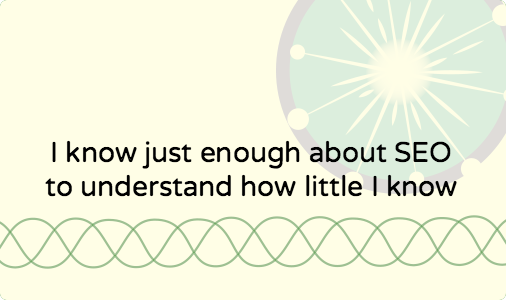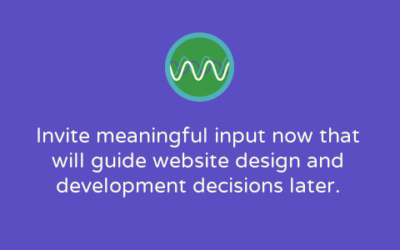Because I write website content for clients, I occasionally come across some interesting SEO (search engine optimization) – and specifically, keyword optimization – requests.
I don’t position myself as an SEO copywriter, but I write digital content for clients and run a multi-author blog. So I take it upon myself to understand some on-page SEO/keyword optimization basics. And I know just enough to realize just how little I know, so I stick to the most important elements and focus on creating quality, readable content.
Strange (but not isolated) keyword optimization request
On more than one occasion, I’ve had clients make requests like this (I’ve made this example up, but it is very much based on real examples):
“The assignment is a story about ‘gold-medal’ volunteers in our literacy program who are true champions of the issue in our community. We’d like to improve our search rankings, so please use the following keywords: read, reading, literacy, champions, gold, medal, Olympics, volunteer, programs, community.”
Even with my limited SEO knowledge, I understand that this doesn’t make sense. I’ve inquired about where keyword lists like come from and I either get no answer or no clear answer. So I asked my friend Yesenia Sotelo at SmartCause Digital what she makes of these requests. Here’s what Yesenia said:
“I believe they are thinking of something that was used back when I started building sites in the late 90s: meta keywords. People used to stuff all kinds of keywords into the ‘meta keywords’ tag, which, because it didn’t work to the benefit of users, has long since become obsolete.”
So… These “meta-keyword” requests are based on an out-of-date practice that attempted to “game the system.” In 2017, they are a waste of time.
Novice? Don't mess around w/SEO. Stick to the basics & focus on creating quality, readable content Click To TweetOptimizing your content for search is about helping search engines to find quality, relevant content that users want. This means our first step is to write useful, high-quality content that will be readable for humans. And when it comes to optimizing your content to rank for certain keywords, I’ve got a few suggestions to help you take it easy when it comes to on-page SEO.
Here are my keyword optimization starting points for non-techies:
Choose relevant terms
The keywords you target should be words and phrases that users type into a search engine when they are looking for content like yours. Looking at the example above, why would a literacy organization want to attract users who are actually looking for information about “gold” or the “Olympics”?
Target one keyword or key phrase per post or page
When it comes to optimizing your post, you’ll need to decide on a single word or phrase to include in important places like your title, URL, and post or page content (read this Copyblogger post: SEO Copywriting: The Five Essential Elements to Focus On.) To do this, drop the long list and pick one word or phrase to incorporate.
Target longer-tailed key phrases where possible
Now that you’re focused on relevance go one step further to “meaningful.” Long-tailed key phrases allow you to get even more specific – and realistically, more likely to rank. What specific information does your desired visitor need (and what do you offer)?
Using the example above, perhaps your goal is to attract interest in your literacy program through your volunteer profile. In that case, instead of “literacy”, you’ll get better results by targeting “Flower Town literacy program.”
Base your keyword selection on research and strategy
Rather than selecting keywords based on assumptions or instinct, effective keyword targeting comes from research. Since this is not a particular strength of mine, I’ll direct you to a better source: the Complete Guide to Keyword Research for SEO from SearchEngineWatch.
Target one keyword or key phrase per post or page #NPMC #SEObasics Click To TweetAvoid implementing outdated SEO practices by staying up to date
With Yesenia’s help, I understood that the keyword confusion I described above came from old advice that was misguided in the first place. So it’s important to:
- Stay up to date
- Learn from reputable sources
To get you on the right track, here are three of my favourite SEO-related blogs, with one particularly good article from each, for beginners:
- MOZ blog: “SEO Is Always Changing”… Or Is It?: Debunking the Myth and Getting Back to Basics
- Orbit Media blog: My Top 3 Free SEO Tips for Beginners
- Yesenia’s blog! SmartCause: The SEO Guide for Nonprofit Writers
Also, a good chunk of basic-level knowledge I have about on-page SEO comes from using the Yoast SEO plugin. I highly recommend it if your nonprofit’s website runs on WordPress.
Don’t forget: there’s more to SEO than optimizing your content
Remember that optimizing your content is just part of SEO. Perfectly optimized content will only get you so far if you haven’t addressed the technical elements. Build your understanding of some basic terms by reading this recent post, Technical SEO Glossary: 7 key factors to maximize your organic search success on the NTEN blog. And then ensure your website is optimized for SEO by reading this article from Mike Mella on the Nonprofit MarCommunity blog, How to optimize a new nonprofit site for SEO.
What to choose and include: keyword optimization basics for non-techies Click To TweetHow did I do? As I mentioned, I realize that I am no SEO expert. But I do want to keep my clients and others from wasting time on outdated or misguided tactics. Did I get it right? Help me – and the rest of us – out by adding your comments below.




